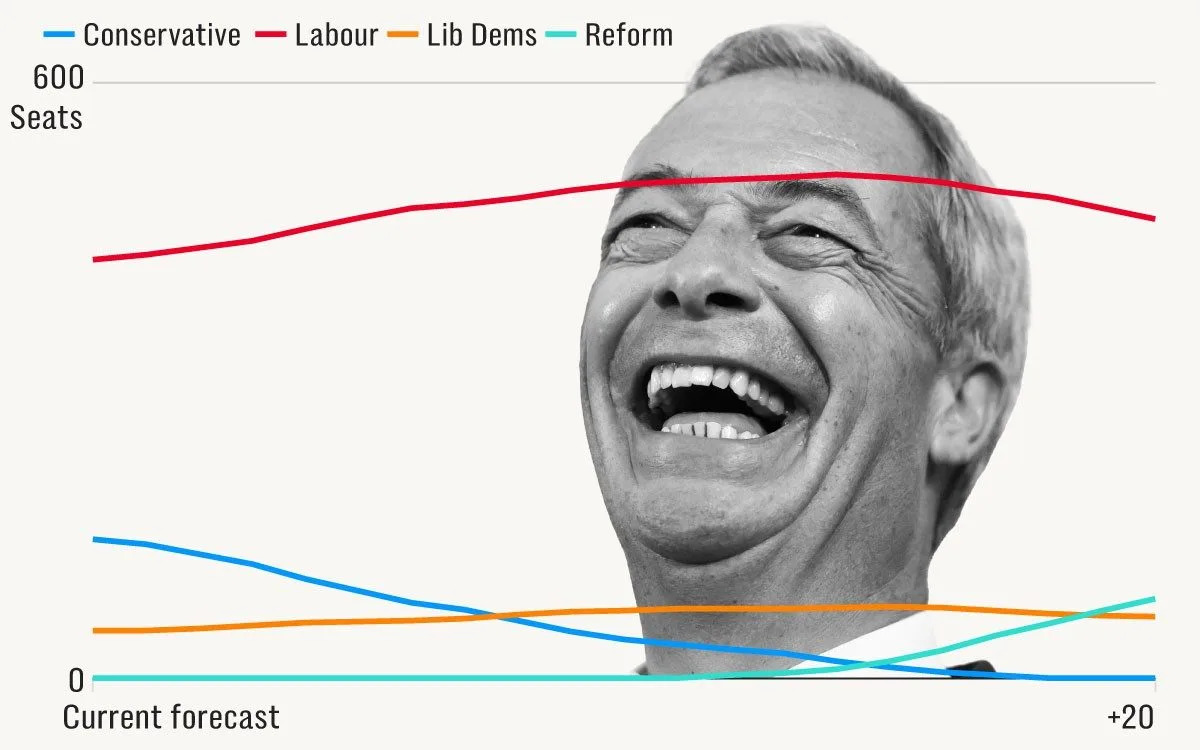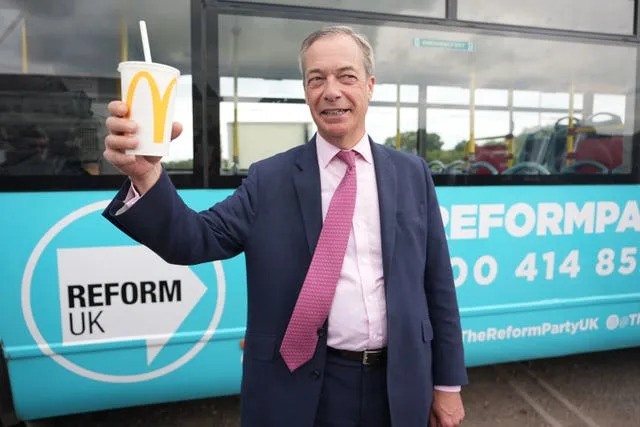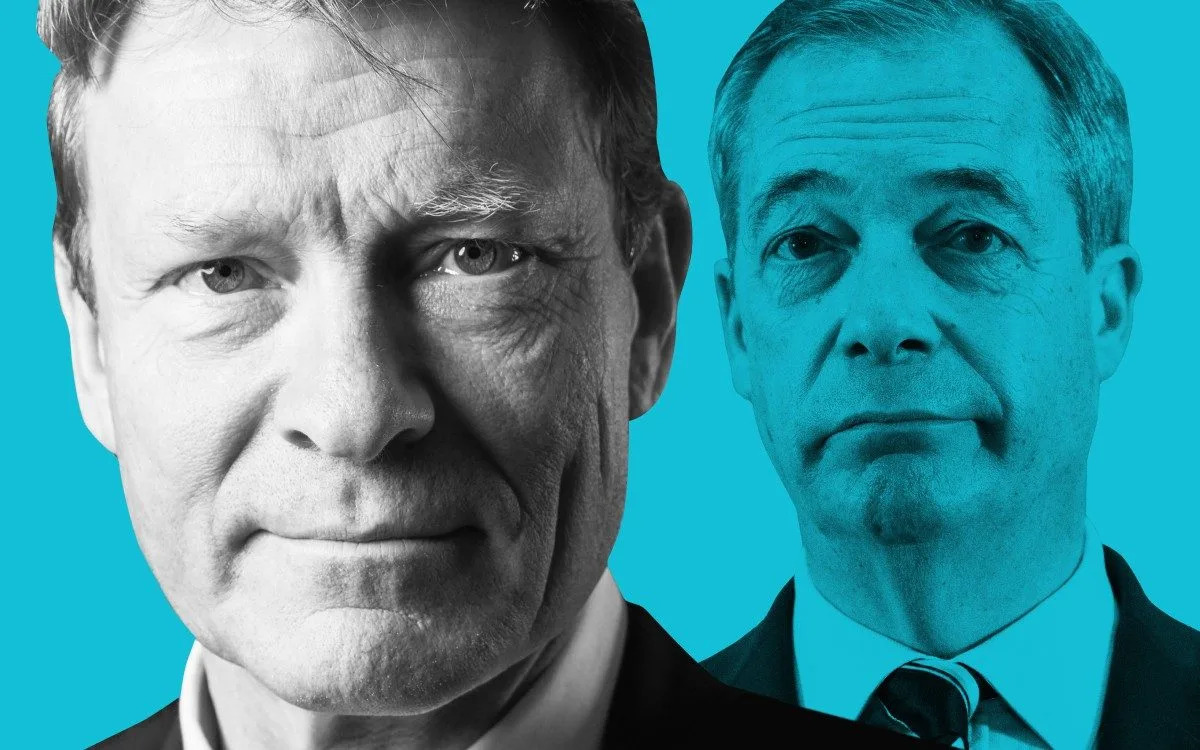By Chris Green

Sunrise Movement activists rally to protest J.D. Vance’s ties to Big Oil outside his office in Washington on Monday. (Photo: Adah Crandall)
Last month, when Donald Trump picked Ohio US Senator J.D. Vance as his vice-presidential running mate, corporate media labeled Vance as an authentic economic populist. The Economist described Vance as a crusader against Big Tech and wrote that he was “staunchly anti-establishment, attacking what he saw as business elites benefitting from moving factories abroad and paying low wages at home.” The New York Times noted that, in his acceptance speech at the Republican National Convention (RNC), Vance “cast Wall Street’s titans as villains.” Vance thundered that the Republican Party was “done catering to Wall Street.” Major Republican donors like the hedge fund mogul Ken Griffith were reportedly upset by the nomination of Vance, a populist demagogue “openly hostile to Wall Street” in the words of the Times.
Among those excited by Vance’s nomination were multiple writers and activists that have sometimes been called “post-left.” Many of these brethren are notable for holding conventional anti-corporate and anti-war left wing views; at the same time, they align with MAGA on issues like immigration, Covid vaccine mandates and “woke” identity politics (especially trans issues). Many of them are notable for arguing that there are many positive aspects to MAGA populism that align with the anti-corporate progressivism of Bernie Sanders.
One notable “post left” thinker is Glenn Greenwald. Greenwald is known for his former position as an investigative journalist at the radical left publication The Intercept and for his involvement in landmark whistleblower cases involving Julian Assange, Chelsea Manning and Edward Snowden. In more recent years, he has been known for his numerous friendly appearances on Tucker Carlson’s Fox News program, his defense of Alex Jones and his breathtakingly bizarre efforts to prove that MAGA aligns with traditional left wing anti-war and anti-corporate values. In 2021, he told the Daily Caller podcast that he considered Carlson and Steve Bannon to be socialists–and that Trump ran as a socialist for president in 2016. Yes he actually said that Trump ran as a socialist in 2016.
It is no surprise that Greenwald has been deeply impressed by the populist figure presented by J.D. Vance. He was pleased when no less an authority than Teamsters president Sean O’Brien spoke to the RNC last month and attested that Vance was a true friend of the working class. In a tweet on X, Greenwald noted excitedly that O’Brien praised Vance–and his fellow senate Republican populist Josh Hawley–for engaging in what Greenwald called “relentless pro-labor acts.”.Regarding Vance, Greenwald described O’Brien as “gushing over how much he’s done for workers.” Indeed, O’Brien told the RNC delegates that Vance “has been right there” in supporting organized labor’s point of view “on all our issues.” .
Like Greenwald, Lee Fang and Zaid Jilani are former investigative journalists at The Intercept. While not embracing MAGA in the extreme manner of Greenwald, both share some of his MAGA friendly “post left” views. Last month, Fang–in an article on his Substack page–and Jilani–in an article for Compact magazine and in an appearance on Democracy Now!–echoed Greenwald’s celebration of Vance for what Fang called the Ohio senator’s “populist, anti-corporate record.” Both cited a nearly identical list of Vance’s progressive accomplishments. The relatively short list featured a number of legislative bills Vance introduced or cosponsored with Democratic colleagues, all of which have stalled in the senate. The list includes bills to: reduce swipe fees imposed on merchants by credit card companies; to cap out of pocket insulin expenses under private health insurance at $35; to tighten regulations on freight rail carriers carrying toxic chemicals after a February 2023 train derailment heavily contaminated the community of East Palestine, Ohio; and to increase capital gains taxes on shares acquired in large corporate mergers.
Jiliani was somewhat nuanced and cautious in his praise of Vance, compared to the mindless cheerleading on the latter’s behalf by Fang and Greenwald. In his Democracy Now! appearance, Jilani noted that Vance would never support Medicare for All; he conceded that Vance opposes the proposed legislation known as the PRO Act, which is designed to make it easier for workers to organize unions. Vance, after all, said Jilani, is a conservative populist, not a democratic socialist. But Jiliani insisted that Vance represented a sincerely populist faction within the Republican Party. This faction represents the view that the promotion of conservative family values requires good paying jobs; the creation of those jobs requires modest governmental intervention in some areas of the economy to regulate the excesses of unfettered capitalism. Jilani noted that Vance’s populist stance is a small minority within a Republican Party which still largely hews to an orthodox big business agenda of tax cuts and deregulation.
Meanwhile Fang laid particular emphasis on Vance’s praise of Lina Khan, Biden’s chair of the Federal Trade Commission, as proof of his populist bonafides. Vance has supported Khan’s vigorous fight for antitrust measures, particularly against Big Tech. Fang noted that Vance quietly filed an amicus brief in a recent Ohio court case in which he argued that Google should be regulated as a common carrier.
Vance’s Record: The Reality
Some have questioned the sincerity of Vance’s populist stance. After all, it wasn’t that long ago when he was an orthodox pro-business Republican who professed disdain for Trump and his voters. Critics have speculated, not implausibly, that once Vance observed Trump’s success, he decided to reverse himself and follow the political winds, becoming a fierce MAGA partisan. Also, as the independent journalist Ken Silverstein observed, there is the fact that while Vance poses as the champion of ordinary people against Wall Street and Big Tech, his top campaign contributors are….Wall Street elites and Silicon Valley billionaires. Vance himself made millions as a venture capitalist. There is plenty of evidence belying Vance’s claim to be a fighter on behalf of ordinary people.
Whether or not he sincerely believes in the above mentioned progressive legislative bills cited by Fang and Jilani, he has shown a vulnerability to backtrack in his support of them under the influence of corporate lobbyists. For example, credit card industry lobbyists recently reported that Vance had backed off on his support of proposed legislation to cap fees for merchants on credit card swipes.
Vance has also worked to dilute the railroad safety legislation he introduced with Ohio’s other US Senator, Democrat Sherrod Brown, in the wake of the 2023 East Palestine, Ohio train derailment. This disaster occurred in Vance’s home state, an extreme act of corporate malfeasance occurring in broad daylight. Even here, as Lever News reported in June 2023, Vance quietly agreed with railroad lobbyist requests to amend his legislation to move back the required date that the rail industry must adopt safer tank cars carrying hazardous materials from 2025 to 2029.
It was profoundly false of Sean O’Brien to say in his RNC speech that Vance was aligned with organized labor on “all” its issues . (Why O’Brien made this statement or spoke at the RNC in the first place is a subject beyond the scope of this article). It is true that Vance opposes Right to Work laws and made a 2023 photo op appearance on a United Auto Workers picket line. However, Vance, as noted above, opposes the PRO Act. One reason he has given for objecting to it is because he wants to institute European style “sectoral” collective bargaining in the US; he falsely claimed that the PRO Act would prevent this. He also criticized it because, as he told Politico, it would “hand over a lot of power to a union leadership that is aggressively anti-Republican.”
As he objected to the PRO Act, he also cosponsored the Team for Employees and Managers Act of 2024 (TEAM). Like previous versions introduced by congressional Republicans in 2022 and 1995, this proposed legislation would reinstitute company unions, which were banned nationwide by the National Labor Relations Act of 1935. Company unions, of course, are not genuine collective bargaining institutions: they are workplace organizations entirely funded by the employer (which can dissolve the organizations at their own will at any time). Republicans have marketed the TEAM Act as populist in the sense that it supposedly would enhance “worker voice” at companies. The TEAM Act is apparently the brainchild of Oren Cass’s think tank American Compass, an institution which has had considerable influence on Vance’s policy proposals. Like Vance, Cass has evolved from an orthodox business friendly Republican–he was Domestic Policy Director of Mitt Romney’s 2012 presidential campaign–into a so-called right wing populist. Cass’s mission has been to come up with “populist” ideas to give a pro-worker sheen to the generally anti-worker Republican Party. Besides such drivel as the Team Act, Cass has advised Republicans to drop their support for Right to Work laws and to scapegoat immigrants as a cause for depressed wages among native born Americans.
Speaking to the Claremont Institute in December 2023, Vance outlined a distinction between “good unions” and “bad unions.” His example of a “good union” was the Fraternal Order of Police. An example of a “bad” one was the Starbucks baristas union. He denounced the latter for attacking Israel. He said “if your politics lead you to defend the baristas union as they defend Hamas, then you should have a different politics.” The baristas, of course, were not actually defending Hamas but objecting to genocidal Israeli war crimes in the Gaza Strip–crimes which Vance has wholeheartedly supported.
There are other cases belying the claims of Sean O’Brien that Vance has been “right there” with labor on issues affecting working people. For example, Vance voted against legislation codifying into law the joint-employer rule of the National Labor Relations Board (NLRB). The rule–before it was rejected by a federal court–established that companies must participate in unfair labor practice complaints filed with the NLRB against companies they employ as contractors. The rule was supposed to help hold companies accountable for participation in labor abuses by preventing them from shielding themselves behind contracting companies. Meanwhile, using talking points used by steel industry lobbyists, in late 2023 Vance successfully lobbied the Environmental Protection Agency to substantially weaken one of its rules limiting carcinogenic emissions from the manufacture of coke, a component of the steelmaking process. Such emissions have had serious negative public health consequences for steelworker communities.
Politico noted that Vance, in opposing the PRO Act, was “in the awkward spot of trying to position himself as [a] ‘pro-worker conservative’ while simultaneously seeking to contain the political power of organized labor, the only entities in American society that reflect–however imperfectly–the actual will of workers.”
Vance’s Actual Constituency
Vance’s pose as the champion of ordinary people should not be taken seriously. Underneath his populist veneer, Vance, like Donald Trump, is devoted to enhancing the ability of economic elites to exploit ordinary people. His “populist” rhetoric inciting racism against Latino immigrants, Islamophobia and transphobia only serves to divide the US working class and strengthen ruling elites.
Vance’s primary constituency is clearly not ordinary people. An informative Washington Post report of July 28th described his real constituency: a network of Silicon Valley venture capitalists centering around Peter Thiel–the latter helped Vance himself get started as a venture capitalist in the early 2010s. These oligarchs provided the financial backing for Vance’s meteoric political rise. Thiel and David Sacks (another prominent Silicon Valley venture capitalist) both reportedly personally lobbied Trump to choose Vance as his running mate. Elon Musk is also known as a strong supporter of Vance.
Specific objections of members of the Thiel network to Biden administration policy–amplified by their messenger boy Vance–were outlined by progressive populist Matt Stoller (research director at the American Economic Liberties Project think tank) in an article on his Substack page last month. In the article and in other writings, Stoller has seemed to take too much at face value Vance’s pretense of being an authentic populist. This is not surprising as Stoller has been noted for problematically collaborating with Oren Cass in trying to find common ground between right wing populists and progressives on economic issues. Nonetheless his Substack analysis of Vance’s financial backers is intelligent, well informed and worth reading.
Stoller noted that Peter Thiel, a billionaire, views himself as an underdog, representing “little tech” fighting against Big Tech monopolies. Thiel invests in startups in industries often dominated by a few companies. Stoller wrote that Vance experienced similar conditions as a venture capitalist: in the mid-2010s, he observed multiple digital advertising startups. These were quality companies, Vance believed, but they would die quickly because they could not compete with Google’s dominance in the online advertising industry. This is the root of Vance’s support for the antitrust actions against companies like Google and Facebook by Lina Khan, Biden’s FTC chair. It is an example of the true nature of Vance’s populist pose which has so impressed the likes of Lee Fang and Zaid Jiliani: he is for the “little guy” i.e. billionaires funding startups who are battling against other billionaires controlling more established companies.
Stoller wrote of a particularly interesting case: the prominent Silicon Valley venture capitalist partners Marc Andreessen and Ben Horowitz. After Vance became Trump’s running mate, the billionaire duo pivoted to supporting the Trump/Vance ticket after primarily funding Democratic candidates for years. Last month, Andreessen and Horowitz filmed a podcast episode where the two discussed their objections to Biden administration policy. Their objections, as laid out by Stoller, are interesting because they are illustrative of the nature of the particular elements of the capitalist class that Vance represents.
First the two objected to Biden’s proposed “unrealized gains” tax on investments, which they claimed would destroy the venture capital industry. Second, they denounced the tight regulation of cryptocurrency and the blockchain in general(in which they are significant investors) by Biden’s Securities and Exchange Commission. Third, Biden’s FTC prevented the sale of one of the duo’s companies (Maze Therapeutics)–which possessed an experimental treatment for a condition called Pompe disease-to the pharmaceutical company Sanofi. Horowitz claimed that the FTC’s blocking of the sale had effectively strangled all venture capital investments in US biotechnology.
Stoller observed that the duo had left out some important details in their complaining about Democratic policy. For example, Stoller noted that “at no point in their praise of the blockchain do they bring up that large swaths of crypto, if not the entire apparatus, turned out to be a giant scam.” The fraudulent nature of so much cryptocurrency is why the FTC has been regulating it and blockchain networks. As far as the blocked sale of Maze Therapeutics, Stoller noted that the pair left out a few important facts:
“The FTC stopped Sanofi from buying Maze Therapeutics not for no reason, but because Sanofi was engaged in an illegal scheme of trying to kill a rival treatment for Pompe disease so it could preserve its ability to charge $750,000 for an annual course. And Maze Therapeutics quickly found a different company to buy their treatment, for the exact same price.”
Stoller observed that–echoing Andreessen and Horowitz–Vance also denounced the Biden SEC’s regulation of blockchain, claiming that SEC chairman Gary Gensler was a “candidate for worst person” in the Biden administration. Vance said he worried whether “a lot of the crypto stuff is fundamentally fake” but argued that it needed to be deregulated in order to fight Big Tech monopolies. Stoller observed that “that’s exactly how Andreessen and Horowitz pitch crypto, its ‘little tech’ challenging the big guys”
The Bottom Line
The truth is that politicians–ranging from a highly dubious reactionary opportunist like J.D. Vance to a much more serious populist like Bernie Sanders–are limited in their ability to pursue progressive economic reform. When powerful economic interests dislike a particular legislative proposal they are able to utilize enormous resources to defeat it: campaign contributions to politicians, enormous armies of corporate lobbyists, legal challenges in the courts, paid advertising on corporate media (where many commentators share a point of view with business). There are innumerable examples of this dynamic at work. For example, Kamala Harris–when she first ran for president in 2019–backtracked on her initial support for Medicare for All after a campaign funded by wealthy financial interests was launched against it (primarily targeting Bernie Sanders). After much flailing around and incoherence, she settled on a reform proposal that left private health insurance in the driver’s seat of US health care.
If business–particularly the financial industry–is upset by governmental policies they can always engage in capital flight: a mass sell-off of assets and withdrawal of investment capital from a country. Liz Truss (who has adopted a right wing populist pose not dissimilar to that of Donald Trump) faced this when she became British Prime Minister in 2022. British financial markets strongly objected to Truss’s proposed fiscal policy of combining tax cuts with energy subsidies for British consumers. The financial markets crashed the British economy and Truss was forced to resign after a month and a half in favor of Rishi Sunak, a more conventional business friendly conservative.
Short of overthrowing the capitalist system, the only hope for serious redistribution of power in favor of ordinary people in the United States is mass social movements that exert overwhelming pressure on ruling class politicians in favor of progressive reform. In the meantime, some of us really need to stop being so credulous about ruling class politicians who adopt populist poses.
ZNetwork is funded solely through the generosity of its readers. Donate




